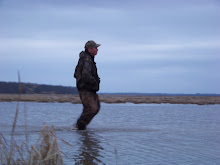"Ten One-Hundred"
Turkey hunters are even more prone than deer hunters to fits of hapless infatuation. Most turkey hunters I know – myself included – spend the first two or three weeks of the spring season enjoying the cacophony of gobbling, going to every turkey that sounds off at daybreak. The first few weeks of the season are typically a buyer’s market, and any turkey that acts right and is capable of being worked is just as good as the next one. Gobblers, during the first one-third of the season are, in a word, fungible.
But then something funny happens every year around mid-April. Just when it seems like the hunting can’t get any better, the birds hit a wall. They enter what is commonly referred to as The Lull.
I’m no wildlife biologist, but so far as I understand The Lull, it is a period when, due to either the turkeys’ adaptation to three weeks of hunting pressure, the relative futility in trying to woo hens who are becoming more interested in laying eggs and nesting every day, or both, gobblers really don’t do a whole lot of gobbling. Not much more than the occasional walk-up gets killed during The Lull. It’s sort of like sitting over a chufa patch in the afternoon, except you don’t already know where to set up your ambush and you’re not nearly as certain of success.
My experience during The Lull has been that only a select few dominant toms will continue to gobble. Most everything else shuts up. These “boss gobblers,” or so they’re called, ostensibly have bullied the subordinate toms into submission, securing for themselves uninterrupted airtime once the pickin’s get slim in the lady-friend department.
Two years ago, one such bird earned itself the unusual moniker of Ten-One Hundred. If you’ve seen that iconic Southern movie classic, Smokey and the Bandit, then you recognized immediately what this gobbler’s name means. If you haven’t, put this magazine down (okay, finish reading my piece first; then put it down), run to your nearest purveyor of DVDs and fork out the dough to purchase this piece of cinematic timelessness. And by all means, pick this magazine back up and finish it after you return. I’ve got kids.
In the film, Bandit educates Frog (played by Sally Field) that “ten-one hundred” is unofficial CB radio code for, well, going Number One. And as Frog points out, “it’s better than ten-two hundred.”
Back to our story. Around 7:50 one unpromising morning, I walked down an old dead-end woods road that drops off into a drain where I knew Ten-One Hundred liked to strut and gobble. I found a good spot under a young magnolia that provided plenty of cover and shade, and made ready my setup. After clipping various branches and brushing in the spot, I acknowledged Mother Nature’s unmistakable call. Better to embark on a blind sit with an empty bladder, I thought, so I pushed myself up off my turkey seat to answer the call, as it were.
I walked down the ridge about thirty yards from my setup to relieve myself. The hardwoods which predominated this portion of the habitat had dropped enough leaves over the winter that my trek up and down the ridge was a noisy one. Truth be told, I didn’t think I was going to encounter a longbeard that day, so I took very little care to silence my movements. I trudged up and down that ridge, kicking, shifting and crunching every oak leaf I came across. I coughed. I cleared my throat. I did everything that would secure an F in Turkey Woodsmanship 101 before retaking my seat.
I plopped myself back down in a not-so-tactful fashion and pulled down my face mask. My shotgun lay on the ground beside my right leg. I adjusted my hat and facemask and looked up, only to see the unbelievable sight of Ten-One Hundred standing in the middle of the road with the sun shining brilliantly upon him. There he was, not 10 yards away from me in front of God and everyone, darting his head and eyes in a constant search. I guess he’d mistaken my sounds for a hen scratching in the leaves.
I froze, motionless. I dared not blink. I’d never been so close to a gobbler before; he looked mammoth, with his big, red head and iridescent chest. Of course, my gun lay obsolete on the ground beside me. It may as well have been a conductor’s baton or an umbrella.
After a few moments, he walked up the road, right past me off my right shoulder. When he passed, he could not have been more than five yards away from me. I didn’t know that I could hold my breath that long, but I didn’t draw in a molecule of air until he and his occasional clucking were long since out of earshot.
I was not aware that relieving oneself was an effective way to call up a mature longbeard. Ten-One Hundred, however, provides the hypothesis. Unless a coyote got him – and I seriously doubt that to be the case – he is now two years older and that much wiser. Of course, I plan on going after him when the opportunity presents itself.
And I’ll drink plenty of coffee and a couple of bottled waters before I do.
(c) Roger Guilian 2011

